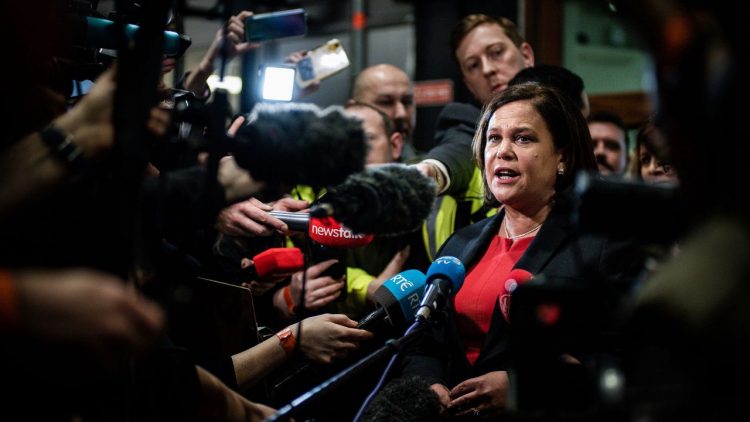Sinn Fein leaders: -Michelle O’Neill and Mary Lou McDonald see the path to Irish unification in political convergence with the Unionists. Soft diplomacy, convergence and shared interests between unionists and nationalists are Ireland’s best path to reunification.
The people living in Northern Ireland should ponder on unification.
The Republican leader said that there would come a day when people would vote on the region’s constitutional future. Today, their focus is on the cost-of-living crisis. Ms O’Neill was reacting to the latest opinion poll on Irish unity, which indicated that fewer than one in three would vote for unification if asked tomorrow. People in the North are not waking up thinking about Irish unity, Sinn Féin’s Michelle O’Neill has said. Ms O’Neill reacted to the latest opinion poll on Irish unity, which indicated that fewer than one in three would vote for unification if asked tomorrow.
The comments from Sinn Féin’s Stormont leader at a pre-election business event in Belfast also came amid claims from the DUP that her party is fixated on pushing for a unity referendum and failed to prioritise those struggling to pay their bills. Addressing the Northern Ireland Chamber of Commerce’s Five Leaders, Five Days event, Ms O’Neill also challenged the DUP to turn up “day one” after May’s Assembly election to form a new powersharing executive. She referred to the DUP’s insistence that it will not re-enter an administration before changes are made to the Northern Ireland Protocol.
IN FEBRUARY, the DUP collapsed the Executive when it withdrew its first minister Paul Givan in protest over the Northern Ireland Protocol. The poll found that 30 per cent would vote for a united Ireland if a referendum was held tomorrow, with 45.3 per cent voting against it and the remainder either not expressing a preference or saying they do not know.
“I think it’s an interesting poll,” Ms O’Neill told business representatives at the gathering in the Europa Hotel. “It’s one in a long line of polls. I looked briefly at the figures this morning, but I don’t think people woke up this morning thinking about that. “I think people woke up this morning thinking about the cost-of-living crisis. I think people woke up this morning around the pressure they feel right now. “So, I’m focused on the cost-of-living crisis, I’m focused now on what I will do in health, I’m focused on what I’m going to do in the Executive on the other side of the election. I’m focused on what I will do with the economy brief. I’m focused on all of these things. “Yes, there will come a day whenever we will vote on the constitutional question, and I will bring my politics to that.” Ms O’Neill said there was no contradiction in Sinn Féin working within the political institutions in Northern Ireland and also pursuing the goal of Irish unity. “But my focus today is on the cost-of-living crisis and getting to the other side of this election, and then trying to form an executive and working with the other parties,” she added.
How are the Sinn Fein leaders so sure about Irish unification?
Irish unity is no longer confined to just wishful nationalists but is now recognised as a serious and pressing issue for governments in Belfast, Dublin and London. John O’Dowd, a politician in the Northern Irish Assembly for Sinn Féin, which supports reunification, said, “We’re looking at it within years, not decades. The demographic and political changes happening in the north and across the island of Ireland won’t wait decades. There’s a growing conversation and a growing swell of opinion around it.” Brexit is one big reason.
In a 2016 referendum, 52% of people in the UK voted to leave the European Union, but 56% of Northern Irish voters supported remaining. As in Scotland, where a majority also backed EU membership, being forced out of the 27-nation bloc stirred nationalist sentiment. Scotland’s government is pushing for another referendum on leaving the UK, a grouping of four distinct nations, including England and Wales. Some 88% of Northern Irish who see themselves as “nationalists” and support a united Ireland — voted against Brexit, compared with just a third who want Northern Ireland to stay in the UK, known as “unionists.” Sinn Féin leader Mary Lou McDonald has urged governments in Dublin and London to begin serious preparations for Northern Ireland’s possible to leave the UK soon.
The Good Friday Agreement of 1998 concluded the Troubles, a decades-long civil conflict that claimed thousands of lives. The UK government may call a vote if it believes there is a likelihood that most would choose to leave the union and join a united Ireland. The Good Friday Agreement of 1998 concluded the Troubles, a decades-long civil conflict that claimed thousands of lives. The UK government may call a vote if it believes there is a likelihood that most would choose to leave the union and join a united Ireland. “People believe as a result of Brexit that Northern contentment with the world after the Good Friday Agreement is no longer settled. The UK itself is unstable,” said Brendan O’Leary, a professor at the University of Pennsylvania. The latter has authored several books on Northern Ireland.
Sinn leaders are working hard for the convergence with Unionists.
The Sinn Féin leader has called for “partnership” with unionists to help realise the party’s objective of a united Ireland. Mary Lou McDonald said unionists must have an “equal part” in building what she described as a new Ireland. “To those of a unionist tradition, I say sincerely, and we seek partnership with you,” she said. It is not for anybody to invite you in; that future is already yours. It is about you, and it is about you. It is for you. “British government after British government has disrespected and failed you, time and again. “Imagine the liberating possibility of complete freedom instead of making all decisions here, in a parliament, for the people who live here. “Instead of a government in London turning its back on you, imagine an Ireland where your place is assured and your rights are enshrined in law.
Also, Sinn Féin’s Michelle O’Neill said that nationalists “are closer than ever [to a united Ireland], and I think now is the time to plan”. She said the UK’s exit from the EU will lead to a referendum on the island of Ireland. Northern Ireland is without a first or deputy first minister after the resignation of Paul Givan last month. The former Democratic Unionist Party (DUP) first minister Paul Givan resigned over his party’s opposition to the Northern Ireland Protocol. That move meant Ms O’Neill was removed from office as the roles were joined. Many unionists, including DUP leader Sir Jeffrey Donaldson and his party, oppose protocol, saying it has placed a border between Northern Ireland and Great Britain in the Irish Sea.
Ms O’Neill said that if Brexit “has taught us anything”, it is that the UK government does not prioritise people in Northern Ireland, “whether you be unionist, nationalist, or other”. A spokesperson for the UK government said it was “absolutely committed to delivering for the people of Northern Ireland”. “We continue to deliver upon our New Decade New Approach commitments, building a better, more prosperous shared future for everyone,” they continued. “Our priority remains to maintain peace and stability in Northern Ireland and protect the Belfast (Good Friday) Agreement.”
Conclusion.
Suppose both Northern Ireland and the Republic of Ireland voted in favour of reunification. In that case, the Good Friday Agreement states that it “will be a binding obligation on both governments to introduce and support their respective parliament’s legislation to give effect to that wish”. Before this can be done, the exact terms of reunification would need to be worked out. One important question would be whether separate arrangements were retained for Northern Ireland or whether the six counties of Northern Ireland would be fully integrated into the unitary Irish state. Now the Sinn Fein leaders are supposed to follow the same “slow and smooth” policy to get converged with Unionists, which is the need of an hour.





























